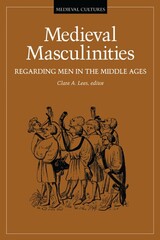2 books by Lees, Clare A.

Gender and Empire, Volume 34
Clare A. Lees and Gillian R. Overing, eds.
Duke University Press
The early medieval world features many examples of empire-building and is noticeably marked by both imperial acts and (post-) colonial fantasies. Yet, these subjects barely register in contemporary analyses of national, colonial, or postcolonial formations. The aim of this special issue of JMEMS is not simply to rectify this omission-to fill in the missing evidence of the colonial and the colonized for the early medieval period. Rather, it will address how sociopolitical and cultural discourses of the imperial are formed and used in these centuries, and how such discourses might differ from the discourses of later periods, whether medieval or early modern. Articles by Beverly Bossler, Guy Halsall, Nicholas Howe, Clare Lees, Fred Orton, Gilian Overing, D. Fairchild Ruggles, David Townsend, and Ulrike Wiethaus cover a wide range of topics: reflections on what "empire" and "medieval empire" might mean, the formation of masculine identities in the late Roman Empire, royal mothers in the hybrid court of an Andalusian dynasty, Rome as capital of Anglo-Saxon England, the meeting of imperial Greco-Roman mores with Anglo-Saxon masculinity in "Apollonius of Tyre," what "style" can tell us about gender and empire in Northumbrian stone sculpture, Hrotsvit of Gandersheim's strategies of the aristocratic female body, and the faithful wives of Song and Yuan China.
Contributors. Beverly Bossler, Guy Halsall, Nicholas Howe, Clare A. Lees, Fred Orton, Gilian R. Overing, D. Fairchild Ruggles, David Townsend, and Ulrike Wiethaus.
[more]

Medieval Masculinities
Regarding Men in the Middle Ages
Clare A. Lees
University of Minnesota Press, 1994
"Ranging from questions of epic violence and heroic embodiments of manhood to constructions of bachelorhood, husbandry, and sainthood, Medieval Masculinities is the first synthesis of medieval and gender studies to focus on masculinities."
Harry Brod, editor of The Making of Masculinities"We should not be working [exclusively] on the subjected sex any more than a historian of class can focus exclusively on peasants."-Natalie Zemon Davis, 1975 In the years since Natalie Davis made this remark, men's studies, and gender studies along with it, has earned its place in scholarship. What is often missing from such studies, however, is the insight that the concept of gender in general, and that of masculinity in particular, can be understood only in relation to individual societies, examined at specific historical and cultural moments. A brilliant application of this insight, Medieval Masculinities is the first full-length collection to explore the issues of men's studies and contemporary theories of gender within the context of the Middle Ages. Interdisciplinary and multicultural, the essays range from matrimony in medieval Italy to bachelorhood in Renaissance Venice, from friars and saints to the male animal in the fables of Marie de France, from manhood in Sir Gawain and the Green Knight, Beowulf, and the Roman d'Eneas to men as "other," whether Muslim or Jew, in medieval Castilian epic and ballad. The authors are especially concerned with cultural manifestations of masculinity that transcend this particular historical period-idealized gender roles, political and economic factors in structuring social institutions, and the impact of masculinist ideology in fostering and maintaining power. Together, their essays constitute an important reassessment of traditional assumptions within medieval studies as well as a major contribution to the evolving study of gender.ContributorsChristopher Baswell, Barnard CollegeVern L. Bullough, SUNY, BuffaloStanley Chojnacki, Michigan State UniversityJohn Coakley, New Brunswick Theological SeminaryThelma Fenster, Fordham UniversityClare Kinney, University of VirginiaClare A. Lees, University of PennsylvaniaJo Ann McNamara, Hunter CollegeLouise Mirrer, Fordham UniversityHarriet Spiegel, California State University, ChicoSusan Mosher Stuard, Haverford College[more]
READERS
Browse our collection.
PUBLISHERS
See BiblioVault's publisher services.
STUDENT SERVICES
Files for college accessibility offices.
UChicago Accessibility Resources
home | accessibility | search | about | contact us
BiblioVault ® 2001 - 2024
The University of Chicago Press









